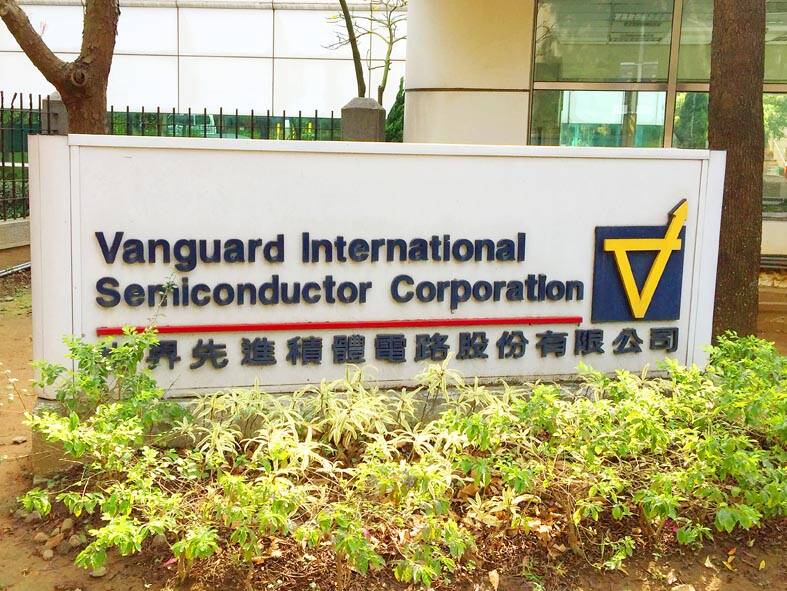Foundry service provider Vanguard International Semiconductor Corp (世界先進) yesterday reported its profit for last quarter — the weakest in six quarters — saying that it expected moderate seasonal corrections in the following two quarters thanks to growing demand for power management chips used in artificial intelligence (AI)-related applications such as servers.
Net profit contracted 20 percent annually to NT$1.69 billion (US$54.7 million) from NT$2.13 billion, also down 16.6 percent from NT$2.04 billion in the second quarter, the company said.
Earnings per share dipped to NT$0.91 from NT$1.29 last year and NT$1.1 the prior quarter, it said.

Photo: Grace Hung, Taipei Times
Vanguard chairman Fang Leuh (方略) said in an earnings conference that as most customers are expected to finalize inventory corrections soon — earlier than forecast — the company expects seasonal corrections to be moderate in this quarter and the next one.
“No significant downside movement is expected,” Fang said.
The revenue momentum would be buoyed by persistent AI infrastructure deployment worldwide, Fang said.
AI-related chip revenue contribution rose to a high-single-digit percentage this year, from a low-single-digit percentage last year, he said.
“Semiconductors play a vital role in global AI hardware investment in the long term, and the company holds an advantageous position in supplying power management chips used in data centers, AI servers and applications,” Fang said.
Vanguard expects revenue growth next year to be buoyed by a 3.1 percent expansion in the global economy and high-teens percentage growth in the global semiconductor industry, he said.
This quarter, wafer shipments are expected to decrease by 6 to 8 percent from last quarter, mostly because of seasonal weakness and year-end inventory adjustments, Vanguard president John Wei (尉濟時) said.
“We have three-month order visibility. The company benefits from stable demand for power management chips for the auto, industrial and server segments, although demand for display driver chips is also expected to be weak,” Wei said.
Average prices for the company’s products are to rise 4 percent to 6 percent sequentially, thanks to a better product portfolio, he said.
Gross margin is expected to improve to about 27.5 percent this quarter, from 26.8 percent last quarter, thanks to a weakening New Taiwan dollar versus the US dollar and a better product portfolio, the company said.
Vanguard retained this year’s capital expenditure at NT$65 billion to NT$70 billion, and would earmark 90 percent of it for its first 12-inch wafer fab in Singapore, which is on track to enter volume production in 2027.

KEEPING UP: The acquisition of a cleanroom in Taiwan would enable Micron to increase production in a market where demand continues to outpace supply, a Micron official said Micron Technology Inc has signed a letter of intent to buy a fabrication site in Taiwan from Powerchip Semiconductor Manufacturing Corp (力積電) for US$1.8 billion to expand its production of memory chips. Micron would take control of the P5 site in Miaoli County’s Tongluo Township (銅鑼) and plans to ramp up DRAM production in phases after the transaction closes in the second quarter, the company said in a statement on Saturday. The acquisition includes an existing 12 inch fab cleanroom of 27,871m2 and would further position Micron to address growing global demand for memory solutions, the company said. Micron expects the transaction to

Vincent Wei led fellow Singaporean farmers around an empty Malaysian plot, laying out plans for a greenhouse and rows of leafy vegetables. What he pitched was not just space for crops, but a lifeline for growers struggling to make ends meet in a city-state with high prices and little vacant land. The future agriculture hub is part of a joint special economic zone launched last year by the two neighbors, expected to cost US$123 million and produce 10,000 tonnes of fresh produce annually. It is attracting Singaporean farmers with promises of cheaper land, labor and energy just over the border.

US actor Matthew McConaughey has filed recordings of his image and voice with US patent authorities to protect them from unauthorized usage by artificial intelligence (AI) platforms, a representative said earlier this week. Several video clips and audio recordings were registered by the commercial arm of the Just Keep Livin’ Foundation, a non-profit created by the Oscar-winning actor and his wife, Camila, according to the US Patent and Trademark Office database. Many artists are increasingly concerned about the uncontrolled use of their image via generative AI since the rollout of ChatGPT and other AI-powered tools. Several US states have adopted

A proposed billionaires’ tax in California has ignited a political uproar in Silicon Valley, with tech titans threatening to leave the state while California Governor Gavin Newsom of the Democratic Party maneuvers to defeat a levy that he fears would lead to an exodus of wealth. A technology mecca, California has more billionaires than any other US state — a few hundred, by some estimates. About half its personal income tax revenue, a financial backbone in the nearly US$350 billion budget, comes from the top 1 percent of earners. A large healthcare union is attempting to place a proposal before